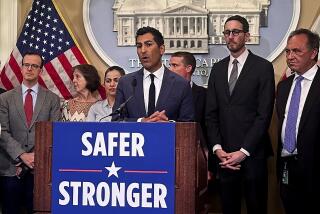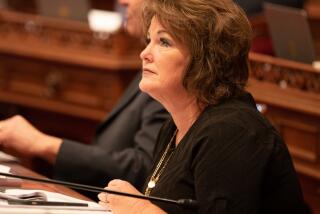House Panel OKs Criminal Penalties for Auto Makers
- Share via
WASHINGTON — Shrugging off an intense lobbying effort by business groups, a House consumer protection subcommittee Wednesday unanimously approved criminal penalties for auto makers who fail to report dangerous safety defects.
The 23-0 vote came in spite of a plea by the U.S. Chamber of Commerce--the world’s largest business federation--that Congress postpone action on auto safety legislation, which arose from the deaths of more than 100 people in crashes attributed to failed Firestone tires.
“We should revisit this in the next Congress, when some of the emotional issues that appear to be driving this are dissipated,” said Bruce Josten, the chamber’s senior lobbyist.
Auto makers, dealers and equipment suppliers are also lobbying Congress separately, seeking to change specific elements of bills speeding through the House and Senate with just two or three weeks left before adjournment.
Until Wednesday, the House had been silent on the issue of criminal penalties, although a Senate committee and Transportation Secretary Rodney Slater had endorsed such sanctions. But key Republican lawmakers normally sensitive to business concerns now appear to be willing to increase the power of federal safety regulators and impose new mandates on business.
“One of the nicest things this Congress can do for the American public is to put this bill on the president’s desk and have it signed before we go home,” said Rep. W.J. “Billy” Tauzin (R-La.), who is leading the House investigation of the tire failures that occurred mainly on the popular Ford Explorer.
In an indication of the support for criminal penalties, Rep. John D. Dingell, (D-Mich.)--an ally of the auto industry--and Rep. Thomas J. Bliley, (R-Va.), chairman of the full House Commerce Committee, voted yes. Rep. James E. Rogan (R-Glendale) abstained on the criminal penalties vote, but backed the bill on final passage. He said the criminal penalties provision might come before the Judiciary Committee--of which he is also a member--and he preferred to deal with it there.
The measure still faces substantial hurdles: a full Commerce Committee vote in the House, and floor votes in both chambers. Moreover, significant differences between the House and Senate versions would have to be reconciled before a final version could be sent to President Clinton.
Generally, both bills require auto makers to report more information on potential safety defects. Federal regulators at the National Highway Traffic Safety Administration would also be required to update 30-year-old tire safety standards. But the bills deal with the issue of criminal penalties in different ways, and the House bill is also expected to mandate a new rollover testing system. Both the House and Senate provisions on criminal penalties are narrowly written to apply only to cases of willful misdeeds.
The auto industry has said it opposes criminal penalties and some of the new information reporting requirements, but could support less sweeping legislation. New-car dealers are concerned the legislation could increase their exposure to product liability suits. Equipment suppliers are worried about reporting requirements and criminal penalties.
Consumer activists say the legislation is overdue. Joan Claybrook, president of Public Citizen, said Wednesday that the bill is a “great improvement” over the initial version. She said the Senate bill is somewhat stronger on criminal penalties, but the House bill has the advantage of also dealing also deals with the issue of rollover crashes.
In a separate development, new NHTSA Administrator Sue Bailey apologized to the Senate Commerce Committee for neglecting to disclose more than $66,000 in political contributions on a routine questionnaire used by the panel to screen nominees for high office.






